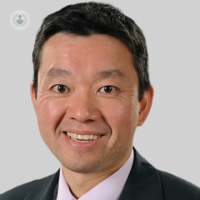A discussion on wisdom teeth management: part 1
Written in association with:Wisdom teeth commonly cause issues such as impaction, crowding, infection, cysts, and damage to adjacent teeth. Their late eruption often leads to misalignment, difficulty cleaning, and potential sinus problems. In the first article of a two-part series, consultant oral and maxillofacial Surgeon Mr Geoff Chiu shares his expert insight on wisdom tooth management.

Issues with lower wisdom teeth
Wisdom teeth, also known as third molars, are the last teeth to erupt in the mouth. They erupt from around the ages of 18 years onward. This is the age when you supposedly develop Wisdom, hence the name. Wisdom teeth are also called the number “8” as they are the 8th tooth from the front of the mouth in each corner.
Due to the modern western diet, which is softer, the teeth in the mouth are not worn down to the same level as they were a century ago when there was a lot of grit in the diet. As a result, the wisdom teeth, being the last to erupt, often do not have enough space to erupt into the mouth and sometimes gum still covers the tooth. These are called partially erupted wisdom teeth. Some may not erupt into the mouth and remain buried.
The varied positioning, impaction, partial eruption, and other factors can lead to issues. In some cases, patients may not be aware that these eruptions are occurring. Furthermore, some individuals may not have all their wisdom teeth.
One common reason for referral is experiencing problems with wisdom teeth, such as pain, swelling, or gum infections (pericoronitis). Decay or food trapping around wisdom teeth may also occur, sometimes without symptoms but with potential hidden problems. There's strong evidence indicating a high risk of decay in mesially or horizontally positioned, partially erupted wisdom teeth, which can affect adjacent teeth.

If left untreated, decay can lead to pain in both teeth, requiring repair or extraction of the affected teeth. Periodontal disease or cyst formation around wisdom teeth are also potential complications. Individuals starting medications like immunosuppressants or bone-affecting drugs should consider assessing their wisdom teeth beforehand, as these medications may impact healing post-extraction. In some cases, extraction may be recommended for wisdom teeth with a poor prognosis.
For those planning long-term travel where access to dental care is limited, addressing wisdom teeth and other dental issues before departure may be advisable.
Do I need to be referred?
While some wisdom teeth removals are straightforward and can be performed by a dentist or specialist, while complex cases or medical concerns may require hospital referral. Oral and maxillofacial surgeons or oral surgeons are often consulted for these cases, providing expertise and guidance to help patients make informed decisions.
Initial consultations may be followed by additional appointments for treatment, if necessary.
Mr Chiu was the representative of the British Association of Oral & Maxillofacial Surgery on the working group that published the updated 2022 UK National Guidelines on the management of lower third molars. He as presented his work at National and International conferences.
If you would like to book a consultation with Mr Chiu, do not hesitate to do so by visiting his Top Doctors profile today


